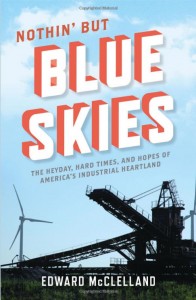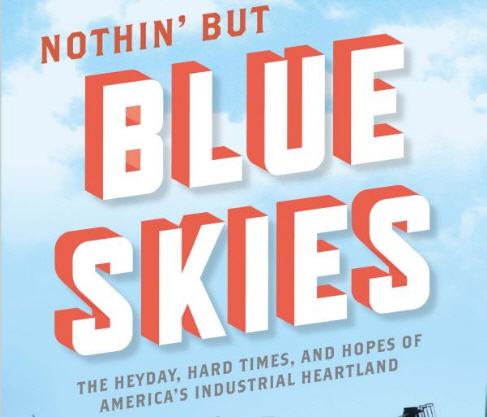Nothin’ But Blue Skies examines the slow rusting of America’s industrial heartland.
When author Edward “Ted” McClelland was born in Lansing, Michigan in 1967, America’s heartland was blasting at full-furnace.
America was on top of the world, its cars were bestsellers and industry production and employment were at an all-time high.
By the time Ted was six-months old, Detroit caught fire due to civil unrest. When he was six, the Arabs stop sending oil to the U.S. When he was fifteen, a presidential candidate claimed that Lansing lay at the bottom of a “Rust Bowl.”
 In his memoir, “Nothin’ But Blue Skies,” Ted draws on a combination of personal memoirs and solid facts to illustrate the fall of a great American empire. Most people of his generation can identify; the rest of us should take it as a cultural warning.
In his memoir, “Nothin’ But Blue Skies,” Ted draws on a combination of personal memoirs and solid facts to illustrate the fall of a great American empire. Most people of his generation can identify; the rest of us should take it as a cultural warning.
After reading “Nothin’ But Blue Skies,” you’ll see how your life has been touched forever by this sunken ship. You will never look at a shuttered factory – or a foreign car — the same way again.
Here, we pick Ted’s brain a bit.
You were born in 1967. Tell us about the heartland world you were born into.
1967 was a time when you never had to worry about getting a job. In the late Sixties, the unemployment rate was never above 3%.
If you went to school in 1965, the job search consisted of cutting class for the day to apply to all the local auto plants in Lansing.
A terrible job shoveling coal into boilers paid enough for a car and an apartment.
The saying used to be: “what’s good for General Motors is good for the country.”
GM was the beneficiary of a lot of military contracts as a result of the Viet Nam war. It was the perfect little war for them.
The heartland was the epicenter of full-speed-ahead economic activity during the postwar years.
They called that part of the country ‘the roar of America’ because that was the steelmaking center of the country.
After World War II, there were 20,000 people working at U.S. Steel.
The nation’s cultural and intellectual trends were on the East and West coasts, but the economic trends start in the Midwest.
[Detroit] was where the $5 a day wage was born with Henry Ford, because he wanted to pay his workers enough for them to be able to buy his cars.
This is where the first sit-down strike that started the United Auto Workers [UAW] union occurred. Lately, it’s been where the mass industrial layoffs started.
What went wrong?
A combination of environmental laws and foreign competition ended up killing the big steel mills in Chicago: U.S. Steel, Wisconsin Steel, Republic Steel.
You didn’t coin the term Rust Belt, but it plays prominently into your story.
The first place I saw that term was in a Time magazine article in 1981. And then Walter Mondale used it on the campaign trail. He accused President Reagan of turning the Midwest into a Rust Bowl. And then it was changed to other regional nicknames, like The Sun Belt and The Bible Belt.
It all came from the term Rust Bowl, which was reminiscent of Dust Bowl, which was another economic crisis that hit the Heartland back in the Thirties.
It’s somehow reminiscent of the Roman Empire, which fell because its leaders got too comfortable.
We were like the Roman Empire after World War II. We were the only world power. We were the only country with any industrial ability left after the war. Everybody else had been flattened.
In the Fifties and Sixties, nobody could compete with us. We had no competition and I think it did make us complacent in the area of automaking.
When the Arab oil embargo came along in ’73, the Detroit auto manufacturers were just not ready for it at all. They didn’t want to make small cars. They couldn’t make enough profit on small cars to pay the benefits that they promised to the UAW. And they didn’t think Americans liked small cars.
In the Fifties and Sixties, everything was getting bigger. Everything was getting ‘more.’ And this was a retreat from that.
When they made small cars, they made terrible small cars, like the Chevette, the Pinto, the Vega and the Escort. I think those cars turned off an entire generation to American autowork.
When did the American “wake-up call” actually happen?
I think we realized in the last recession what the Midwest had gone through in the Eighties. A lot of it emanated from the housing market and the auto industry. They talk about how the housing crisis can be traced back to a single neighborhood in Cleveland.
When Wall Street crashed, then the auto industry crashed, and the whole economy crashed. We probably were in a state of denial throughout the Nineties, but I think that’s over now.
In your book, you mention the advertising campaign, “Not Your Father’s Oldsmobile.” Although the term and its meaning caught on in the culture, the actual campaign itself was a death knell for Oldsmobile. How?
‘Not your father’s Oldsmobile’ was actually a very ineffective ad campaign, because it reminded people of everything Oldsmobile wasn’t.
The term caught on, but you shouldn’t put a negative in an ad campaign. It reminds people that, ‘yeah, Oldsmobile is an old person’s car.’ I think that was a terrible ad campaign. It helped ruin the brand’s image.
How bleak is the heartland’s future?
The future of this area is in skilled labor and high-tech manufacturing. We’re never going to go back to that day again when that unskilled high-school student is going to walk into a factory and make a middle-class wage. Those days are over.
Read Ted’s book here
.

